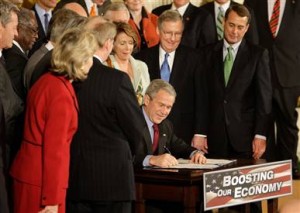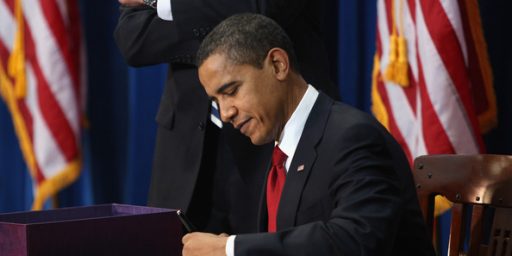Bush Stimulus Packages

President Bush, surrounded by members of Congress, signs the Economic Stimulus Act of 2008, Wednesday, in the East Room of the White House in Washington. (Ron Edmonds/AP) Feb. 13, 2008
Some on the left are under the impression that the Bush administration failed to provide stimulus to get us out of the current economic mess, so we therefore need even more stimulus now.
Matt Yglesias: “When you see conservative complaining that the stimulus bill is too expensive and won’t be fast-acting enough, keep in mind that had they not blocked stimulus last year on the grounds that it was too slow and expensive, we probably wouldn’t be in a position today where we need such a large fiscal expansion.”
Steve Benen: “Last year, as economic conditions were deteriorating, then-President Bush believed no action was necessary (that is, unless congressional Democrats were prepared to make his tax cuts permanent, because nothing leads to success like repeating failure). Democratic lawmakers raised the specter of a modest stimulus — nowhere near the scope of the current proposal from the Obama administration — and Republicans balked.”
Are we living in some sort of parallel universes? Here on Earth Prime, this happened a year ago:
President Bush on Wednesday signed a multibillion-dollar economic rescue package on Wednesday that means $300 to $1,200 rebates for many American households. Bush called the measure “a booster shot for our economy” to stave off a recession. Several dozen members of Congress, including House Speaker Nancy Pelosi, stood on the stage behind Bush as he signed the bill.
And this happened last October:
After two weeks of contentious and often emotional debate, the federal government’s far-reaching and historic plan to bail out the nation’s financial system was signed into law by President Bush on Friday afternoon. “By coming together on this legislation, we have acted boldly to prevent the crisis on Wall Street from becoming a crisis in communities across our country,” Bush said less than an hour after the House voted 263 to 171 to pass the bill.
The House vote followed a strong lobbying push by the White House and other supporters of the bill. The House rejected a similar measure on Monday – a defeat that shocked the markets and congressional leaders on both sides of the aisle.
Now, I happened to oppose these measures as ill-thought-out and hasty, as did many conservatives. But they did happen. At least, in this reality.






It sounds to me as though for Matt and Steve “stimulus package” is shorthand for “big federal infrastructure program”.
As I understand the arguments about the Keynesian multiplier, different kinds of spending produce different multipliers, with extending unemployment benefits or the like having the highest multiplier, following by works projects, permanent tax cuts, and by one-time tax rebates. Again, as I understand the argument the multiplier is related to the velocity at which money changes hands for the different approaches.
The complaint then becomes one of electing less effective measures rather than more effective ones.
My own view BTW is that the only measures likely to have much stimulus effect are transfer payments to people in the hardest circumstances because they’re the most likely to be spent quickly. Works projects make Depression Era assumptions about the nature and structure of our economy today that just aren’t true.
From a political posturing standpoint the cool thing about the other argument, that Bush didn’t spend enough, is its utter unverifiability.
I was just commenting on Will Wilkinson’s blog that everybody forgets the first stimulus. It’s not just the left.
Strangely though, I put in context with the Bush tax cuts, as more evidence that while tax cuts sometimes work as stimulus, they don’t always work.
I said the new reliance on tax cuts in this new stimulus is very worrying, and concluded:
Dave, you and I know that we are in a Great Deleveraging. It may not be as bad as Ray Dalio’s D-Process, but then again it might.
The question for realists is how much policy should attempt to soften that deleveraging, or whether we can really stand the natural fall.
I think that before that question is addressed we need to arrive at a conclusion about whether policy can soften it.
If it can’t then the prudent thing to do is the smallest plan that demonstrates that Washington is doing something about the situation. That’s at odds with the best political strategy.
There are a few things that strikes me about conservative criticisms of the Obama plan is the about face they have done on their comfort level with deficits. When it came to dumping epic piles of money into a literal black hole in Iraq and Afghanistan over the last 8 years, there was no limit. All of a sudden they are outraged when cash is being used for projects in the US. It’s like as long as you can make some specious argument for fighting terrorists then deficits don’t matter (as Reagan told us).
The second thing that is striking is that Obama bends over to make a huge chunk of the plan “tax cuts†which we already know won’t really do all that much to create jobs, and it’s still not enough. DeMint wants all tax cuts which is every bit the deficit creator as anything in the Obama plan.
I for one am not at all convinced that any of this is a stimulus per se. Rather, as mentioned, it’s a way to soften the blow during a contraction. But in order for that to work tax rates have to be higher during the good times to pay the down the debt, so that spending in bad times is easier to rationalize. Republicans have made the climate for anything that smells like a tax increase that it’s impossible to do anything about the debt. You can’t just keep cutting taxes.
Even if there were no stimulus bills no amount of spending cuts, short of wholesale elimination of all entitlements, could ever come close to balancing the budget. So Republicans need to explain to me why it is that blank checks for “fighting terrorists†over the last eight years is ok and deficit spending to help actual Americans is a horrible assault on fiscal solvency.
I think there is the tautology that a dollar spent is a dollar spent. The most extreme stimulus foes do suggest that you can drop $800B into an economy without a ripple, or a job, resulting.
Obviously in the short term there will be paychecks. Those checks might provide a stair-step to our contraction.
Now, does such a stair-step meet your definition of “soften?” I think it does mine, because jobs are hanging on, in restaurants, retail, etc., that might drop out without that pause.
Without the pause, isn’t there a greater chance that correction can become over-correction?
Here is an interesting piece. James Hamilton reminds us how we got here and then closes with three interesting paragraphs:
Does that mean that he likes the stimulus that is actually stimulus? That is the infrastructure spending that some conservatives are attacking?
I don’t think that James’s post should be interpreted that way. The spending he’s endorsing is an extremely small proportion of the total bill which, due to the nature of the spending, will be next to useless in creating jobs in the near term.
Note, too, that he’s not endorsing the measures he does because of their fiscal stimulus effect but because of their longterm effects on productivity.
Bush did not provide a stimulus package; it was a tax cut. He even stopped referring to it as stimulus at one point and just called it tax cuts. This tax cut was pushed despite the advice that extending unemployment and food stamp programs would provide a maximum multiplier of the taxpayer money spent. It is every bit as stupid to call the Bush tax rebate/cuts stimulus as it is to call green energy or electronic medical records stimulus. All of these may be good long term policy, but none of them are the kind of stimulus we need to soften a depression. To give an example in the extreme; would giving Madoff’s hedge fund a tax break help solve his problems?
I agree with that. Note that extending unemployment is a very small component of the current stimulus package making its way through Congress and that, at least according to recent reports, expanding food stamps has been cut from the Senate’s version of the bill.
Is it your position that it would be stupid to call the proposed stimulus package a stimulus package?
Fred, the good argument for some kinds of infrastructure, Inc. green power, is that we are going to do them anyway. Time shifting spending is the best way to make it counter-cyclical.
(I was not thinking of James re. other conservatives and stimulus)
True. Quite clearly, if it involves a tax cut of any kind, it is not a stimulus according to Benen and Yglesias. the only thing in their mind that actually qualifies as a stimulus, is directed Federal oversight spending. Spending on things that Democrats would have spent money on anyway, only now, they’re spending more.
Of course, by the lights of Obama, I’m unpatriotic for even thinking such a thing. He’s said objection to the political payoffs he proposes are unpatriotic.
But…. Remember when he used to object to his patriotism being questioned?
Ah, Bit walks up to be “the most extreme stimulus foe” – tell us exactly how you can repair a bridge or build a high voltage transmission line without hiring anyone?
Perhaps I’m drawing too many conclusions from this off-hand remark but I think that it strikes to the heart of the debate over the nature of the stimulus package.
First, I think you misunderstand what is meant by “the smartgrid”. Most of the work is design and software. Relatively little would be building in the sense of iron, steel, and cement and practically none of it would be unskilled work. In all likelihood a good chunk of the software development would be done in India, like many largescale software projects these days.
The nature of the spending matters in how much stimulus is produced, at least as I understand it. So, for example, giving $800 billion to one person wouldn’t produce as much stimulus as giving a couple of hundred thousand dollars to a couple of million would. The multiplier is derived from the number of times the money changes hands (again, at least as I understand it).
Additionally, building roads and bridges isn’t unskilled work any more, either. It’s skilled or semi-skilled work and the jobs can’t be created instantaneously.
That’s the second point: whatever the virtue of the project money spent in 2011 or 2012 won’t stimulate the economy in 2009 or 2010.
That’s why I favor passing a stimulus package immediately that consists mostly of extending unemployment benefits, expanding foodstamps, and a permanent reduction in FICA for both employers and employees.
Debate the infrastructure spending part of the stimulus package as a separate bill.
Energy and Environment actually had been my key interests 2005-2007 (before economics grabbed my attention). My blog has a lot, really a lot, of energy posts in that time. Back a bit earlier I had a job doing computer work for Clean Air Act (Phase II), and visited gas and coal plants in several states, hung with their engineers, etc.
It sounds like you are concentrating on the user end of the grid, where I am thinking about the other end. Here in California solar and wind farms are limited by lack of a DC backbone for desert transmission. That is not a software problem.
Here’s a note from Texas:
Here’s what you’ve got to ask yourself: Are you actually proposing that we let the bridges fall down? Or are you merely proposing that we fix them in a better economic climate?
If we want to keep the bridges, and be counter-cyclical, then I think there is just one answer.
No, I’m not thinking about the user end; I’m thinking about the distribution end—the way the power gets from where it’s generated to where it’s used. That’s what people are talking about when they talk about smartgrids and only a portion of that development will be powerlines.
I certainly think that roads and bridges that the people who use them feel are important enough to maintain should be maintained and that’s less likely to happen during a sharp downturn. When projects have already been rejected because the people who are closest to them don’t think they’re worth paying for, I think we should look at them with a careful eye.
Additionally, I believe that we should think in future terms rather than in past terms. What do we need for future productivity, what will continue to be useful for a long period of time?
Odo there is also a third option, which is to create a separate bill that is intended to update bridges and roads, but to not somehow intimate that it is that spending that is going to stimulate the economy.
I believe that upgrading the power grid is something our country must do at some point soon, and I also am strongly in favor of building nuclear power plants.
I am not sure either of these is stimulus though-both would take a lot of time to plan and design, if we are currently in an emergency, I am not seeing the stimulus here.
I think the problem with the stimulus bill is that the democrats got together and threw every pet project into the bill they could think of and just called it stimulus. Some of those ideas and projects very well may be stimulus, others may be a good idea, but they don’t belong in a stimulus bill.
My opinion on spending almost a trillion dollars is that we need to be careful that what the bill includes are truly things that will help, and aren’t just some congress members pet project or nod to their constituents.
Correct. To be specific, the illusion that government is the only solution. In reality, government is the problem.
As do I.
I really don’t know why you are narrowly focussed on smart grids Dave. It’s true that some have suggested them, either as specific architectures or broad categories, as stimulus … but there is no reason someone looking for “good projects” or especially “time shifted projects” would have to be so constrained.
If we are going to be rational, and counter-cyclical, we are going to look for projects we’d have to do anyway in the near future.
Does repairing a bridge “early” mean less or more total spending? My experience with maintenance is that problems fixed early cost less. Maintenance delayed costs more.
Just me, the environmental economists are big on their stuff not being in the stimulus bill, if you can imagine. They are worried about “two birds with one stone” being less efficient than one. I gather you are saying the same with respect to maintenance.
Ok, fine. We spend $800B now for “stimulus” in a hypothetically pure way (probably not possible anyway). What do you do next year when you need money for your maintenance or your wind power transmission lines?
Stimulus has opportunity costs, it’s not just the other way around.
Ahhh yes. the “Chinese Economic Recovery Act”…
Sorry guys, but I don’t think just throwing money at the problem, is quite good enough.
And Bit: Credit where credit is do, I actually agree with you here (except for the last part… SS is a problem that has to be addressed, sooner or later, a temporary reduction I might go along with, permanent… no way)
odo: agreed, totally. If we are going to spend money, let us spend it on things that, at the very least, might very well pay us dividends down the road.
And Bit… Gov’t is not the problem… Politicians (and their constituents) are the problem. C’s want something for free… P’s are more than willing to “give” it to them….
New year, same myopia
Funny bit, when you wanted to Invade Iraq, government was the ANSWER.
Its funny too, because when Bush spent on infrastructure in Iraq, the GOP was cheering. When Obama wants to spend on infrastructure in America, the GOP is furious…
Well, actually it is sickening, not funny, but I think you see my point.
Its funny too, because when Bush spent on infrastructure in Iraq, the GOP was cheering. When Obama wants to spend on infrastructure in America, the GOP is furious…
Well, actually it is sickening, not funny, but I think you see my point.
Eliminating it is the only real solution.
THe military being one of the few functions of government actually constitutionally mandated.
I’ll be kind and presume you’ve not compared the costs of each.
This coming from the rocket scientist who insists the military is not part of the federal government.
They are not equivalent, but that is not really the point. Besides what is the total cost of the unnecessary Iraq war skippy?
Must be nice for you having an ideology that relieves you from actually having to think about anything.
Its funny too, because when Bush spent on infrastructure in Iraq, the GOP was cheering. When Obama wants to spend on infrastructure in America, the GOP is furious
You all keep saying this — or things very like it. Which can only mean you’re not actually paying attention when we criticize this so-called stimulus. As usual, you’re just attacking a strawman.
We don’t (necessarily) object to infrastructure improvements. But, as pretty every commentator agrees, few of those kinds of projects can contribute to “stimulating” the economy because they simply can’t get started fast enough. As such, there’s absolutely no reason that such spending must be rushed out the door right friggin’ now. Except, of course, that public opinion is turning sharply against the bill, so the Funding A Permanent Democrat Majority With Our Grandchildren’s Money wishlist has to be rushed if it’s to get passed at all.
While you all are busy pretending we oppose infrastructure spending per se simply because we don’t like the mechanism by which its being (kinda-sorta) done, we aren’t being fooled. Your attempts to distract, obfuscate, and keep the discussion away from our real complaints aren’t working. No rational, intellectually honest person can claim $5 billion for ACORN, et al, will “stimulate” the economy. Nor will tens of millions for the NEA. Those may, or may not, be reasonable ways for the Democrats to spend taxpayer funds (probably not), but they have next to nothing to do with economic stimulus.
Just off the top of my head, FICA and payroll tax reductions/holidays would do a lot more (or, as noted above, there could be some significant unemployment/food stamp provisions), but Harry and Nancy wouldn’t be able to control how that got spent, so they didn’t happen.
Dodd, when they did the first stimulus they said they couldn’t wait for infrastructure projects because we’d be in recovery by summer ’09 anyway. We should be so lucky.
I think it’s safe to say that if we need transmission lines, accelerating the projects will at least improve the chance that they are built in the tail of the recession. (In the best case scenario that they can be accelerated and that the recession is short.)
BTW, I’ve got no problem with extending unemployment. There is no need to change the rules to expand food-stamps. The recession is doing that already.
Reduced payroll taxes might “soften” the deleveraging in the sense that people will pay down their debts a little faster, but as observers note, if those credit repayments go to zombie banks, not much new lending or activity is likely to come out of it.
Dodd,
You will not get any argument from me that the Democrats on the hill have done us all a disservice by loading the bill up with Pork. Reid is an idiot and Pelosi is just a run of the mill political hack who is in over her head.
I pine for the days when talented people like Howard Baker and Tip O’Neil ran the show on the hill. Regardless of your politics, they were men of real ability who were worthy of respect.
That being said, the GOP spent 600 billion on an elective war in Iraq while the right stood and cheered. We could use that money now, no?
If that’s the issue then I would suggest to you that the first question that ought to be asked is what prevented us from installing those lines in the first place? But it be government backed NIMBY< by chance? Sorta like refineries, the railing, and nuclear power plants, but the isn’t it?
Now, suddenly, we find ourselves in a situation where the entity that cause the problem … the government … suddenly wants to ride to the rescue? You’ll forgive me if I don’t stand and salute.
so what you’re saying is, that these aren’t the best the democrat party has to offer? Gee, that wasn’t the tune I was hearing just a short time ago.
I thought it didn’t matter where the money went when stimulus was the order of the day? Didn’t it, for example, bevacqua Jordi of that money go toward the manufacturer of military hardware from domestic sources? I should think that would be considered legitimate stimulus given the parameters that Obama has laid out for this bill that is forcing down our throats.
Oh, wait a minute. That’s right, the current bill doesn’t have any military spending in it, does it? He doesn’t even LIKE the military, ala Clinton. I wonder how much he’s spent on trying to find a new name for The War on Terror?…..
Lord knows, after having read the bill, the thing contains everything else but military spending, and for that matter anything but what I would call economic stimulus. Does seem to have a goodly amount of political payoffs attached to it though.
.
In the first place moron, there is no such thing as the “Democrat Party”. But hey, wear your ignorance like a badge. You are sort of the OTB equivalent of the ditzy chick on the Progressive Insurance commercials
Secondly, I don’t think you will find words of praise for Pelosi and Reid from me.
As for your other point, sorry, it is just too idiotic to respond to.
Thats your bushie philosophy, you know, the one that helped get us into this mess. We are trying to do things a little differently now.
I don’t know Bit, did we need Jack and his Magic Transmission lines? I don’t know how else we’d get them, short of identifying the need, fighting the NIMBYs, and building them.
As far as where the money goes, and how targeted the stimulus can/should be … I think it matters less than economists think. Well I mean first economists are not the masters of prediction they think they are. And second broad spending is more likely to have broad impacts.
They only thing I’d look out for would be that projects are not so dumb that we wouldn’t be doing them without the rush. I don’t think we are in the kind of downturn where you do actually pay people to dig holes and then to fill them up again.
enjoy:
Your view noted and disregarded out of hand.
Well, then where the hell were the Democrat party on this stuff a few years ago, before we got to the ‘crisis’ level? Is this the Rahm effect again?
Not unlike most facts it seems.
Seriously James, you need better spoofs.